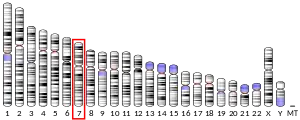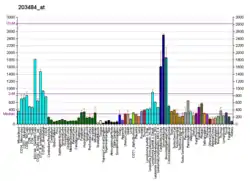SEC61G
Protein transport protein Sec61 subunit gamma is a protein that in humans is encoded by the SEC61G gene.[3][4][5]
Function
The Sec61 complex is the central component of the protein translocation apparatus of the endoplasmic reticulum (ER) membrane. Oligomers of the Sec61 complex form a transmembrane channel where proteins are translocated across and integrated into the ER membrane. This complex consists of three membrane proteins- alpha, beta, and gamma. This gene encodes the gamma-subunit protein. Alternatively spliced transcript variants encoding the same protein have been identified.[5]
References
- GRCh38: Ensembl release 89: ENSG00000132432 - Ensembl, May 2017
- "Human PubMed Reference:". National Center for Biotechnology Information, U.S. National Library of Medicine.
- Hartmann E, Sommer T, Prehn S, Görlich D, Jentsch S, Rapoport TA (February 1994). "Evolutionary conservation of components of the protein translocation complex". Nature. 367 (6464): 654–7. doi:10.1038/367654a0. PMID 8107851. S2CID 4323463.
- Greenfield JJ, High S (May 1999). "The Sec61 complex is located in both the ER and the ER-Golgi intermediate compartment". Journal of Cell Science. 112 ( Pt 10) (10): 1477–86. PMID 10212142.
- "Entrez Gene: SEC61G Sec61 gamma subunit".
Further reading
- Wiertz EJ, Tortorella D, Bogyo M, Yu J, Mothes W, Jones TR, Rapoport TA, Ploegh HL (December 1996). "Sec61-mediated transfer of a membrane protein from the endoplasmic reticulum to the proteasome for destruction". Nature. 384 (6608): 432–8. doi:10.1038/384432a0. PMID 8945469. S2CID 6276718.
- Chen Y, Le Cahérec F, Chuck SL (May 1998). "Calnexin and other factors that alter translocation affect the rapid binding of ubiquitin to apoB in the Sec61 complex". The Journal of Biological Chemistry. 273 (19): 11887–94. doi:10.1074/jbc.273.19.11887. PMID 9565615.
- Zhang QH, Ye M, Wu XY, Ren SX, Zhao M, Zhao CJ, Fu G, Shen Y, Fan HY, Lu G, Zhong M, Xu XR, Han ZG, Zhang JW, Tao J, Huang QH, Zhou J, Hu GX, Gu J, Chen SJ, Chen Z (October 2000). "Cloning and functional analysis of cDNAs with open reading frames for 300 previously undefined genes expressed in CD34+ hematopoietic stem/progenitor cells". Genome Research. 10 (10): 1546–60. doi:10.1101/gr.140200. PMC 310934. PMID 11042152.
- Hartley JL, Temple GF, Brasch MA (November 2000). "DNA cloning using in vitro site-specific recombination". Genome Research. 10 (11): 1788–95. doi:10.1101/gr.143000. PMC 310948. PMID 11076863.
- Wiemann S, Arlt D, Huber W, Wellenreuther R, Schleeger S, Mehrle A, Bechtel S, Sauermann M, Korf U, Pepperkok R, Sültmann H, Poustka A (October 2004). "From ORFeome to biology: a functional genomics pipeline". Genome Research. 14 (10B): 2136–44. doi:10.1101/gr.2576704. PMC 528930. PMID 15489336.
- Mehrle A, Rosenfelder H, Schupp I, del Val C, Arlt D, Hahne F, Bechtel S, Simpson J, Hofmann O, Hide W, Glatting KH, Huber W, Pepperkok R, Poustka A, Wiemann S (January 2006). "The LIFEdb database in 2006". Nucleic Acids Research. 34 (Database issue): D415–8. doi:10.1093/nar/gkj139. PMC 1347501. PMID 16381901.
This article is issued from Wikipedia. The text is licensed under Creative Commons - Attribution - Sharealike. Additional terms may apply for the media files.


